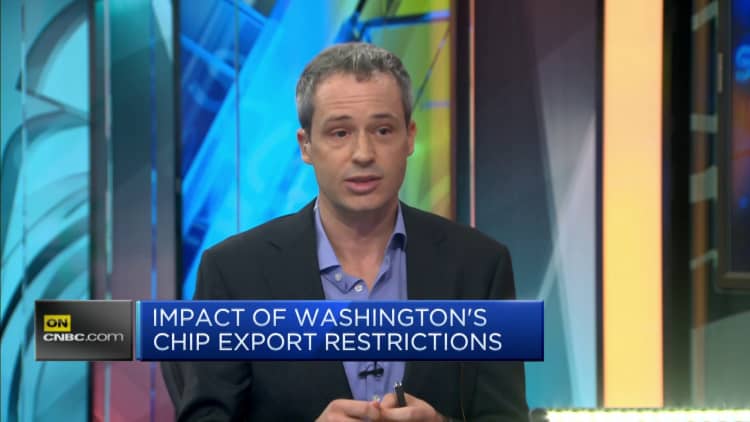Nio says Nvidia chip restrictions won’t hurt them
Chinese electric car maker Nio joined others in the industry in saying that U.S. restrictions on Nvidia chip sales to China wouldn’t affect business.

- Last week, Nvidia disclosed the U.S. will require the chipmaker to get a license for future export to China for certain products, in an effort to reduce the risk they are used by the Chinese military.
- “We believe this will not have an impact on our business operations,” William Li, founder, chairman and CEO of Nio, said via the company’s translator during an earnings call Wednesday. That’s according to a StreetAccount transcript.
- The Nvidia Drive Orin chip has become a core part of assisted driving tech for Nio and other electric car companies in China.
BEIJING — Chinese electric car maker Nio joined others in the industry in saying that U.S. restrictions on Nvidia chip sales to China won’t affect the automaker’s business.
Nvidia disclosed last week that the U.S. will require the chipmaker to get a license for future export to China for certain products, in an effort to reduce the risk of them being used by the Chinese military.
“We believe this will not have an impact on our business operations,” William Li, founder, chairman and CEO of Nio, said via the company’s translator during an earnings call Wednesday. That’s according to a StreetAccount transcript.
“Based on our estimations, our computing power is sufficient for our autonomous driving technology development in the aspect of the AI training for now,” Li said. “And we have been working very closely with our partner Nvidia.”
The Nvidia Drive Orin chip has become a core part of assisted driving tech for Nio and other electric car companies in China. An online Nvidia blog post described how Nio’s new ES7 SUV came with four such chips, including one that enabled the car to learn from individual driver preferences.
The new U.S. restrictions target Nvidia’s A100 and H100 products, whose sales are part of the company’s far larger data center business. The products are graphics processors that can be used for artificial intelligence.
Li said Wednesday there are many companies in China with artificial intelligence training chips, and that Nio is evaluating opportunities to work with different companies.
But he said the U.S. restrictions would not affect Nio’s long-term strategy.
Last week, automaker Geely said it won’t be affected by the new restrictions, as did autonomous driving start-ups WeRide and Pony.ai.
Earlier this week, Chinese financial news site Caixin reported that He Xiaopeng, chairman of electric car start-up Xpeng, said the restrictions would bring challenges for all autonomous driving algorithm training on cloud computing platforms.
But he said the company has bought enough of the high-tech products to meet demand for the coming years, according to the report. Caixin cited He’s post on a personal WeChat account, which is similar to a private Facebook news feed post.
Xpeng did not immediately respond to a CNBC request for comment.
— CNBC’s Arjun Kharpal contributed to this report.



